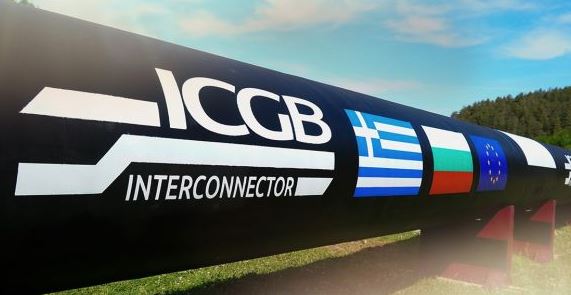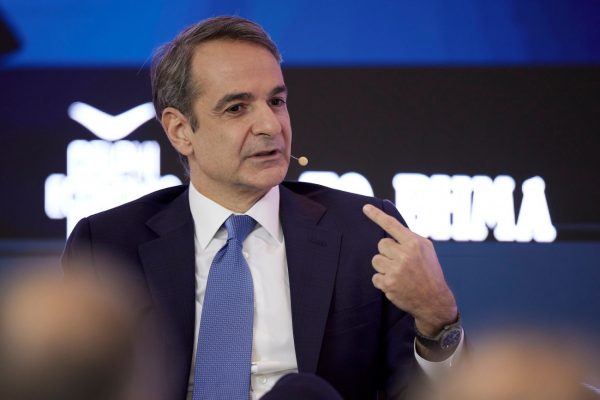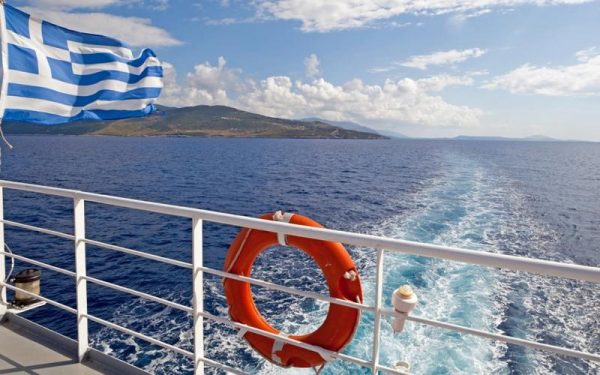
At noon at the under construction (double) measuring station of IGB in Komotini and the pace of work in progress has hit “red”, with cars belonging to the constructor, AVAX, constantly coming and going in the area, transporting workers and raw materials. The IGB pipeline, an energy project that is expected to change the energy map of the region, is in the final stages, at a time when dramatic developments in Ukraine – beyond geopolitical and humanitarian – have triggered the most serious energy crisis in Europe in decades.
“At the moment, in relation to the Greece-Bulgaria interconnector IGB, we are entering the completion of the project, which as a whole has a 90-95% progress rate and we believe that everything will go well, it will end on time and will be able to to supply gas in early July – as planned – from Greece to Bulgaria “, explains to the Athenian / Macedonian News Agency George Tasakos, head of the Department of Education and Networks of AVAX, personally inspecting the progress of the work.
The project consists of an 182km pipeline, a metering station in Bulgaria, Stara Zagora, as well as two metering stations in Komotini. Its projected length is 182 km and its diameter is 32 cm, while the entire pipeline will be underground, at a depth of at least one and a half meters. Its estimated capacity will be up to three billion cubic meters, heading from Greece to Bulgaria.
“The metering station in Stara Zagora, which will connect the pipeline to the gas system in Bulgaria, is ready mechanically, electrically and now the construction work is finished. The 182 km pipeline has been completed and we are in the final stages of testing. The 130 km have already been hydraulically tested and within the next 15 days the next 50 km will have been completed “, points out Mr. Tasakos.
Regarding the progress of the project at the measuring station of Komotini, which was visited, a few days ago, by the Minister of Environment and Energy Costas Skrekas (represented the Prime Minister Kyriakos Mitsotakis, who could not attend due to covid) and Bulgaria’s Prime Minister Kiril Petkov notes that “we are at a progress rate of about 70% and in the next 30-45 days the electrical and mechanical work will be fully completed and by mid-May the remaining civil engineering work will be completed.”
The pipeline will be connected to the Greek national gas transmission system and to the Trans-Adriatic Natural Gas Pipeline TAP in Komotini and to the Bulgarian national gas transmission system in Stara Zagora. In fact, in a recent development in relation to the course of the pipeline, the ICGB project manager recently announced that there was a successful connection of the IGB with TAP, with the implementation of two “golden welds”, which connect the measuring station of Komotini with the existing TAP infrastructure. This is a development that marks a key step in the completion and launch of the IGB commercial operation.
A project that makes Greece a fuel entry gate for SE Europe
AVAX undertook the implementation of the pipeline through the international tender announced by ICGB, which is a joint venture of the Bulgarian BEH, which holds 50%, and the IGI Poseidon consortium, which has the remaining 50% (percentage evenly distributed among DEPA International Works and Italian Edison). AVAX won the relevant international tender with a bid of 144.85 million euros.
It was the company’s many years of experience in natural gas infrastructure, with the construction of the first similar projects in the 1990s, which led to the undertaking of a complex project, such as the IGB, for the completion of which Greece and Bulgaria are looking forward to alleviate the burden of the effects of the war in Ukraine (and) on the critical energy sector.
The pipeline will carry Azeri gas via the Southern Corridor to Bulgaria, diversifying supply sources in the neighboring market. However, its strategic importance is broader as it is expected to be a key link in the chain of the Vertical Corridor, a pipeline system that will connect Greece, Bulgaria, with Romania and Hungary, operating in addition to the planned floating liquefaction natural gas regeneration terminal (FSRU) of Alexandroupolis. If we add to this chain the Bulgaria-Serbia interconnector IBS (with natural flow from Bulgaria to Serbia), which according to the existing schedules is expected to be completed within the current year, then the significant benefits can be enriched. from the further utilization of IGB.
The most important aspect of the project, however, is that it is an energy project that will make Greece a gateway for fuel for the whole of Southeastern Europe, as pointed out by both the Greek Minister of Environment and Energy and the Prime Minister of Bulgaria, during the visit to Komotini. “The Greek-Bulgarian IGB pipeline is a project that promotes energy security in the region. It establishes the role of our country as a transit hub for natural gas for Southeastern Europe and upgrades the region geopolitically. “In the face of fragile international circumstances, we are strengthening Greece’s energy competitiveness and creating new export prospects,” said Mr. Skrekas.
After all, as pointed out in numerous studies on the energy security of the region, the Balkan Peninsula, with its significant amount of energy sources, is a potential energy corridor, with the transfer of energy raw material from the Caspian to the European Union in general.
A complex project that successfully “faced” the pandemic
It is a complex project, the construction of which according to schedule began in February 2020, however, the outbreak of the health crisis, about a year later, forced the company to change its design to address the problems that arose in an unprecedented situation. internationally. By focusing on the goal and allocating more resources, the company managed to cover a significant part of the delays to the extent that the Prime Minister of Bulgaria himself underlined, inspecting the progress of the work, that “more has been done within three months than what was done in the previous year [despite the pandemic].”
“The pandemic adversely affected, to a large extent, the progress of the project”, admits the head of the Department of Education and Networks of AVAX Mr. Tasakos, explaining the difficulties that the company executives were called to face: “We had the following issues: first, when the pandemic started, the construction site was in a phase of mobilization and we had ordered special equipment from abroad for the welding of the pipeline. The completion of the order coincided with the start of the pandemic. The borders were closed, the industries were closed and this caused a delay of several months in the arrival of the equipment to start the work. At the same time, in the beginning there was an issue in the mobilization of the staff, which was frightened, while in the second phase of the pandemic 2/3 fell ill, at different times. “In the third phase, we had a big problem with the materials that have a long delivery time, where the deadlines were not met by the foreign suppliers and the producers – as many of them have their origin in China.”
The complex puzzle of the supply of materials was also influenced by the transport part, with the puzzle of logistics looking for strong solutions. “There were very long delays not only in production but also in transportation, logistics and even delays that not only could not be affected, but you did not even know them. Why could it be due to the fact that the competent authorities in the country of production of the materials stopped the operation of the material production industry, or allowed its operation two days a week instead of seven, or there were no carriers to transport the materials to the port, or “why ships were not allowed to dock, whether they entered the port and were quarantined, etc. It was and still is an unforeseen situation for which there is no precedent”, explained Mr. Tasakos, noting that the result of all this was delays in critical materials of the project, such as the valves that are placed along the main pipeline, the pipes and the fittings for the construction of the measuring stations in Komotini, which also affected the start time of the works in the (double) measuring station of Komotini, etc.
Nevertheless, “with more resources we managed to accelerate the activities and catch a goal that until recently was very difficult to believe that we could achieve”, he points out, emphasizing the company’s experience in major projects. , which contributed significantly to mitigating the effects of the pandemic.
The relationship and benefits for local communities
In fact, this experience had a positive impact on the company’s relationship with the local communities through which the pipeline passes, since, as Mr. Tasakos explained, everything went well. With the work of TAP in the area but also the work of Megalopolis as a guarantee, in the company “there is a great experience how we communicate the benefits of the project to the people who are directly or indirectly affected by the construction”, he stated characteristically.
As it is pointed out, during the selection of the final route of the project, a special consideration was paid to avoid passing near existing buildings or future structures, housing and other infrastructure in order to minimize interference with local communities. In fact, environmental and topographic surveys were carried out as well as surveys for any archaeological finds, in order to determine the most appropriate construction techniques, while the work area is restored in the best possible way in relation to the previous situation and where required, construction protection measures are taken to avoid erosion and surface soil is replaced again to restore and return the soil surface to the previous state and to start the growth of vegetation as soon as possible and / or to sow mild agricultural crops.
As a result, the final route is a combination of environmental and social impact assessment and, as far as possible, avoidance or mitigation of the relevant impacts.
Latest News

DM Dendias: We talk With Turkey But We Always Bring Up Their Unacceptable Positions
Second and last day of closely watched conference, entitled 'Metapolitefsi 1974-2024: 50 Years of Greek Foreign Policy', also included appearances by PM Mitsotakis, Ex-PM Tsipras and PASOK leader Nikos Androulakis, among others

Rhodes Airport Tops Fraport Greece’s Regional Airports in 2024 Performance
According to Fraport's data, more than 35 million passengers (specifically 35.2 million) were handled by Fraport-managed airports during the 11 months.

European Central Bank Cuts Interest Rates by 25 Basis Points
It is the fourth cut of interest rates by Europe’s central bank, a move expected by the markets and financial analysts leading to the rate settling at 3%.

Airbnb: New Measures Add €600 in Extra Costs for Property Owners
Property managers face an immediate administrative fine of 5,000 euros if access to the inspected property is denied or any of the specified requirements are not met.

Economist: Greece Included in the Best Performing Economies in 2024
Meanwhile, Northern European countries disappoint, with sluggish performances from the United Kingdom and Germany.

EasyJet Expands Its Routes from Athens
The airline’s two new routes will be to London Luton and Alicante and they will commence in summer 2025.

Capital Link Forum Highlights Greece’s Economic Resurgence; Honors BoG Gov Stournaras
Capital Link Hellenic Leadership Award recipient, Bank of Greece Gov. Yannis Stournaras, an ex-FinMin, was lauded for his pivotal role during Greece’s economic recovery

Tourist Spending in Greece Up by 14%, Visa Card Analysis Shows
Greece’s capital Athens emerged as the most popular destination, recording a 17% increase in transactions with Visa cards, surpassing even the cosmopolitan island of Mykonos.

Inflation in Greece Unchanged at 2.4% in Nov. 2024
The general consumer price index (CPI) posted a 0.4% decrease in November compared to the previous month

2024 Christmas Holidays: Extended Shop Hours Schedule
The 2024 Christmas Holidays extended shop hours schedule commences on Thursday, December 12 and runs until the end of the year.

![Φυσικό αέριο: Δυναμικό come back του LNG στην Ελλάδα [γραφήματα]](https://www.ot.gr/wp-content/uploads/2023/01/OT_naturalgas-90x90.jpeg)












![Fraport: Πάνω από 35 εκατ. επιβάτες στα αεροδρόμια το 11μηνο – Πτώση στη Μύκονο [πίνακας]](https://www.ot.gr/wp-content/uploads/2022/06/fraport-90x90.jpg)


















![Φυσικό αέριο: Δυναμικό come back του LNG στην Ελλάδα [γραφήματα]](https://www.ot.gr/wp-content/uploads/2023/01/OT_naturalgas-600x474.jpeg)








 Αριθμός Πιστοποίησης Μ.Η.Τ.232433
Αριθμός Πιστοποίησης Μ.Η.Τ.232433